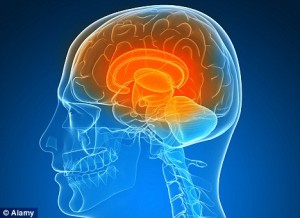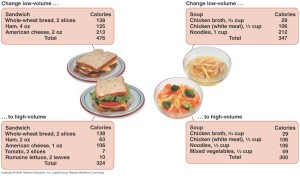 Feel your fullness sounds simple—a ‘no brainier,’ right? Intuitive, one might say. For some people, eating just to the point where they feel full is an unconscious habit and they cannot imagine doing otherwise. For others, though, eating has become disconnected from physical sensations. For them, eating starts when it is time to eat, and ends when the plate is clean.
Feel your fullness sounds simple—a ‘no brainier,’ right? Intuitive, one might say. For some people, eating just to the point where they feel full is an unconscious habit and they cannot imagine doing otherwise. For others, though, eating has become disconnected from physical sensations. For them, eating starts when it is time to eat, and ends when the plate is clean.
Eating is meant to satisfy your appetite and your taste buds, but when you don’t feel full after a meal, this can lead you to either eat more or feel unsatisfied with your meal. If you’re trying to keep your weight under control, a failure to feel full can be cause for concern. Feeling satisfied after a meal is a complicated process that involves hormones and your brain. Understanding how feelings of fullness are triggered can help you determine why you don’t feel full after a meal.
What Can Cause Us to Disconnect From Fullness Sensations
 “Over Strict Dieting”
“Over Strict Dieting”
When people diet or depend on other external factors to dictate the amount and kind of food they eat, they can lose touch with the physical sensations of hunger and fullness. Because hunger varies each day, trying to eat the same number of calories every day means that some days this will be too much, some days too little and only occasionally will it be just right. Reconnecting with the body’s signals of fullness will help you eat just what is needed every day.
Dieting is not the only reason people lose touch with fullness. Eating without regard for physical signals of fullness may be rooted in some long-held values or habits. These are described below along with ideas to help return to a more physically-connected way of eating.
 Resign from the clean plate club.
Resign from the clean plate club.
As children, many of us were admonished by our well-meaning parents to eat everything on our plates. The idea of wasting food was a sin to folks who had grown up knowing scarcity. Today, the problem of overabundance is more common. We may have developed a habit of eating to completion, no matter how much food is in front of us or how hungry we are at the start. Or possibly you were taught that eating all your food came with a reward, such as a dessert, play time or even accolades of being called a “good eater”. It can help to recognize that stuffing oneself with too much food is just as wasteful as leaving something on the plate. Also as adults you don’t need rewards for over eating. You are in charge of how much you eat, that has its own reward.
Unconscious Eating
Unconscious eating is a habit of eating while doing something else, like watching television or reading. Suddenly, the whole bag or plate of food is gone, but you are not really aware of what you ate. You may not feel very satisfied. Honor the gift of food and put pleasure back into eating by giving meals and snacks the attention they deserve. Turn off the TV, put away the newspaper, get away from the desk and eat attentively. Focus on the way food looks, smells and tastes, and really enjoy what you eat.
Try Not to Let Yourself Get Too Hungry
When hunger is overwhelming, it is very difficult to savor what is being eaten. If hunger strikes when mealtime is still a way off, take a snack break.
Fullness Sensations
Feeling full after eating a meal can be equal parts physical, such as your stomach stretching because it’s full, and mental.
 Hormones and the Brain
Hormones and the Brain
Your stomach has receptors that send messages to your brain to tell it when you are full. Just as it takes a few rings to reach someone on the telephone, the messages between your stomach and brain aren’t instantaneous. Your stomach needs anywhere from 10 to 45 minutes to release the hormone cholecystokinin, which signals your brain that you are full. If you are eating too quickly, your hormones may not be signaling that you are full.
Mindful Eating
The mental part comes from the satisfaction associated with eating a meal. Your taste buds and your sense of smell can play a role in helping you feel full after a meal. If you have eaten very quickly, there’s a chance you may not feel as full as if you had slowly savored each bite. This is called mindful eating, in which enjoyment of food leads to increased feelings of satiety.
 Energy Density
Energy Density
Volume and number of calories can affect your feeling of fullness. Eat foods that are low-energy dense, which means they are low in calories, as well as high in bulk. This means that you can eat a larger volume of food without consuming too many calories. When you eat low-calorie foods, you are able to eat more of them, which can stretch your stomach and activate the hormone receptors that trigger feelings of fullness. Think of it this way: Eating two chocolate chip cookies is equivalent to eating a full bowl of green salad with tomatoes, cucumbers and low-calorie dressing. The cookies and the salad may have comparable calorie counts, but the salad is more likely to leave you feeling full. If you do not feel full after eating, consider switching to foods that have a low-calorie density.
Take these Measures to Help You Stay Connected to Your Fullness Sensations
- Serve smaller helpings. Put a reasonable amount of food on a plate or bowl instead of eating out of the bag. No need to overload your plate, chances are there is more if you did not have enough to feel satisfied. Or better yet remember your next meal is just a few hours away no need to over eat at this meal.
- Set aside some of what is served to take home or to enjoy later, or share your portion with a companion.
- Stay focused on the meal,stay in the moment when eating. Taste and savor your meal. Keep distractions to a minimum.
- Don’t let yourself get over hungry. Skipping meals or waiting to long will backfire on you and can make it harder to know when to stop eating at your next meal.
- Stay in CHARGE of how much you eat. Give up the notion of a clean plate if you feel fulness coming on.
- Slow down! Meal time is not a race. Give your brain time to let you know you are approaching fullness before you overeat.
- Choose your food wisely! Select volume dense food vs. energy dense food to help fill you up on low calorie nutrient dense food that will allow you to feel satisfied for hours after eating and not leave you at risk for cravings.
- Develop strategies to defend against well-meaning but misguided food pushers. Remember, no one but you can feel your fullness. Practice saying “no, thank you” in a pleasant, but firm voice. Statements like these might be of some help: “I’d love to eat more, but I really can’t eat another bite. Or, “I’d love to try that. Could you save me a piece for later when I’ll be hungry and can truly enjoy it”
- Help reinforce your decision to stop eating with a gesture. Try placing a napkin or flatware across the plate, nudging the plate away from the table edge just a bit, or even removing the plate from the table.




